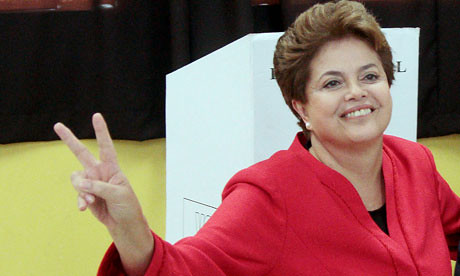
Brazil Worker's Party President Dilma Rousseff won the national run-off elections in the South American state whose economic and political influence is growing throughout the region and the world., a photo by Pan-African News Wire File Photos on Flickr.
Havana. May 24, 2012
Brazil seeking the truth
Laura Bécquer Paseiro
Granma International
FULFILLING one of her electoral promises, Brazilian President Dilma Rousseff has established a Truth Commission, which is to investigate human rights violations in the country, including those committed during the military dictatorship (1964-1985). The Commission is headed by former Justice Minister José Carlos Dias and former Attorney General Cláudio Fonteles. It was officially constituted on May 16.
Thousands of Brazilians were killed
during the military regime.
While the Truth Commission does not have the authority to punish those responsible for crimes – as it cannot supercede the 1979 Amnesty Law, which prevents legal proceedings against those responsible for murder, disappearances and acts of torture committed by the dictatorship – it can call witnesses under oath and have access to government documents. Moreover, it has two years to hear the testimonies of victims and witnesses, and analyze all the information it considers necessary to clarify the facts.
Its starting point is investigations undertaken prior to the Amnesty Commission, which studied formal requests for state apologies to victims of the military regime, and those of the Political Deaths and Disappearances Commission, responsible for acknowledging them.
With this initiative, the government hopes that an account of what happened during the years of 1964 through 1985 will act as a guarantee that Brazil will never relive a similar situation.
The measure was accompanied by the Access to Information Law, which obliges all spheres of public power to divulge information required by citizens in simple and direct language, with facilities for finding the information on Internet.
The legislation also establishes a 25-year confidentiality period for ultra-secret documents, 15 years for those which are secret, and five for reserved ones. These periods can only be renewed once.
Brazil has thus joined countries such as Argentina, Chile, Peru and Guatemala, where similar commissions have been created to reveal those horrific moments of their histories.
"This is a historic date for Brazilians. Two laws have been approved which deal with different, but connected, issues; they represent a decisive step in the consolidation of Brazilian democracy," affirmed Rousseff, who clarified that the objective is not to promote revenge against those who committed crimes, but to seek the truth.
This issue is one which directly touches the President, who personally experienced dictatorial repression. Rousseff was a member of the Palmares Revolutionary Armed Vanguard and the National Liberation Commando guerrilla groups. During this period she was known as the Joan of Arc of the guerrilla movement.
She was arrested in 1970 and subjected to sessions of torture for 22 days. Her imprisonment lasted for three years. "Nobody comes out of that unscathed," she confined herself to saying to the Brazilian Piauí magazine, a few months before she won the 2010 election.
Various political leaders suffered similar persecution during the dictatorship, including former President Luiz Inácio Lula da Silva (2003-2010), who was imprisoned for standing up to the regime as a labor leader.
His predecessor, Fernando Henrique Cardoso (1995-2002), was exiled in Chile, and singer-songwriters Gilberto Gil and Caetano Veloso took refuge in London.
The Truth Commission created in Brazil is fundamental to the new generations knowing their recent past, when thousands of people were incarcerated, tortured and murdered.
No comments:
Post a Comment